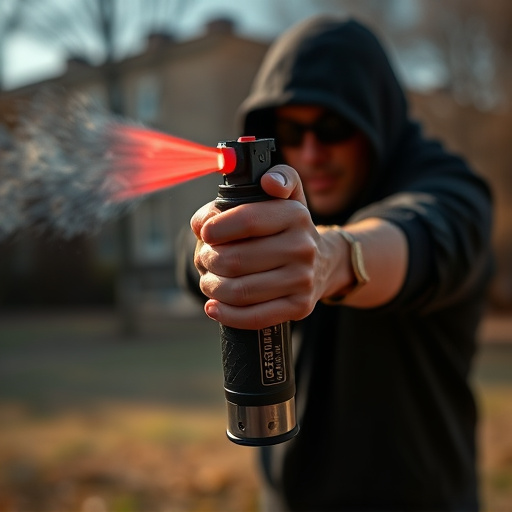TL;DR: If pets are exposed to pepper spray, immediately rinse affected areas with water for 15 minutes, provide a warm and safe space, monitor breathing, and seek veterinary help. Remove contaminated clothing, ensure fresh air, and gently clean skin. Prompt action is crucial to prevent severe symptoms like eye irritation, coughing, and temporary blindness, ensuring the pet's well-being and quick recovery.
“In today’s unpredictable world, having a reliable self-defense tool like anti-assault pepper spray is crucial. While often discussed for human safety, its application for pets’ protection deserves equal attention. This article guides you through the essentials of using and managing pepper spray in defending your furry companions. We’ll explore the immediate effects on pets, best practices for deployment, and essential care strategies when treating pets exposed to pepper spray. By understanding these aspects, you can ensure your pet’s well-being and peace of mind.”
- Understanding Pepper Spray and Its Effects on Pets
- When and How to Use Anti-Assault Pepper Spray on Pets
- Treating and Caring for Pets After Exposure to Pepper Spray
Understanding Pepper Spray and Its Effects on Pets
Pepper spray, a powerful defense tool designed for personal safety, can inadvertently affect pets if they come into contact with it. Understanding its impact on animals is crucial when considering it as a self-defense mechanism. When used correctly, pepper spray creates temporary disorientation and pain by irritating the eyes and respiratory system in humans. However, pets, especially dogs, can also experience these symptoms, including tearing eyes, coughing, difficulty breathing, and even temporary blindness.
Treating pets exposed to pepper spray requires immediate action. Rinse the affected area thoroughly with water for at least 15 minutes, ensuring all traces of the spray are removed. Provide a warm, safe space for them to rest and recover, as they may feel disoriented or weak. Monitor their breathing and seek veterinary attention if necessary, especially for any signs of respiratory distress. It’s important to note that while pepper spray is designed to cause temporary discomfort in humans, it can have more severe effects on smaller animals, hence the need for prompt and proper treatment.
When and How to Use Anti-Assault Pepper Spray on Pets
If your pet is ever exposed to pepper spray during an attack, it’s crucial to act quickly and appropriately. The initial reaction should be to move your pet to a safe, well-ventilated area as soon as possible. Pepper spray can cause temporary but severe irritation in pets, much like it does in humans, so prompt treatment is essential.
To treat your pet after they’ve been exposed, start by removing any contaminated clothing or accessories. Rinse their eyes gently with clean water for at least 15 minutes to flush out the pepper spray. For respiratory distress, provide fresh air and seek veterinary assistance immediately. Lightly dabbing a damp cloth on their fur can help alleviate skin irritation, but avoid rubbing. Monitor your pet’s behavior and comfort levels, and if they exhibit persistent discomfort or unusual symptoms, consult a veterinarian for further guidance.
Treating and Caring for Pets After Exposure to Pepper Spray
Pepper spray, while an effective self-defense tool against potential assailants, can inadvertently affect pets if they come into contact with it. If your pet is exposed to pepper spray, it’s important to act swiftly and provide proper care. The first step is to remove any contaminated clothing or bedding immediately to prevent further irritation. Rinse the affected area thoroughly with water; for eyes, flush them gently but continuously for at least 15 minutes.
Seeking veterinary assistance is crucial, as a professional can assess any internal or external damage and provide appropriate treatment. Symptoms of exposure may include coughing, difficulty breathing, skin redness, or irritation. It’s recommended to have your pet checked even if symptoms seem mild, as pepper spray components can cause delayed reactions. Proper treating pets exposed to pepper spray not only ensures their comfort but also helps them recover quickly, allowing you and your furry companion to return to normal activities soon after.
Anti-assault pepper spray can be a valuable tool for protecting pets from potential threats. While it’s crucial to understand its effects on animals, especially in terms of Treating Pets Exposed to Pepper Spray, responsible use can help keep your companions safe. Knowing when and how to deploy this defense mechanism ensures their well-being during frightening encounters. Always seek veterinary care after exposure to address any adverse reactions and provide the necessary support for a full recovery.
